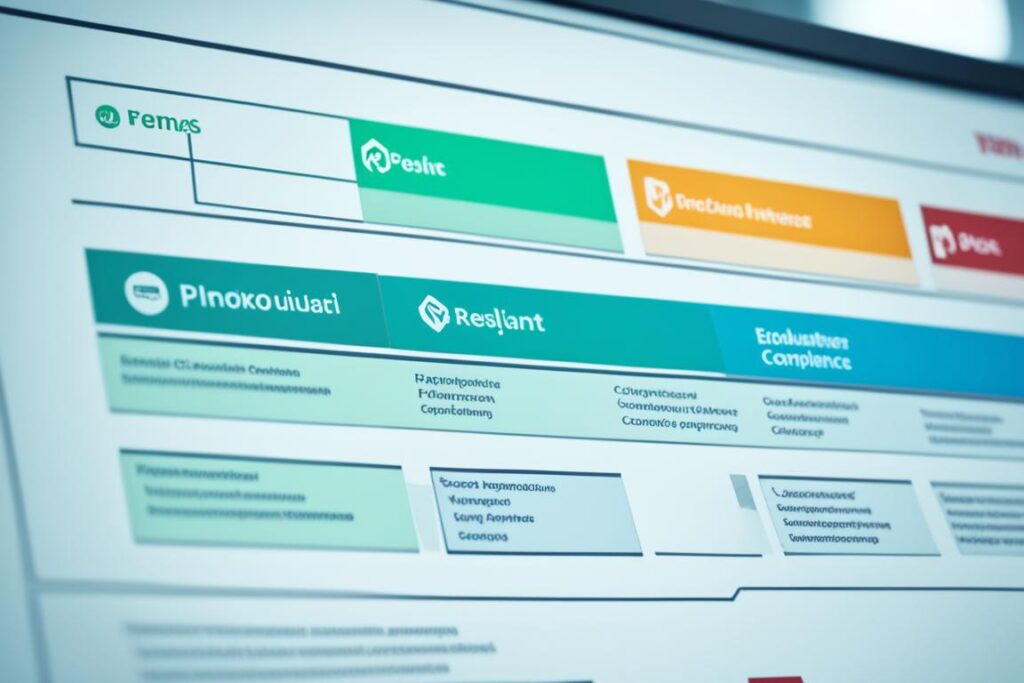In today’s fast-paced world, regulatory compliance has become an integral part of every business operation. Failing to comply with legal standards and regulations can result in severe consequences, including hefty fines, legal proceedings, and loss of reputation. The solution lies in utilizing regulatory compliance software, which acts as a compliance management tool to ensure adherence to various regulatory requirements effectively.
In this article, we will discuss the top regulatory software solutions available in the market, their benefits, and how they streamline compliance processes for businesses.
With the help of compliance tracking software, compliance management becomes more accessible, ensuring that your business is always on the right side of the law. Whether you’re operating in finance, healthcare, or any other regulated industry, investing in regulatory compliance software is crucial for your success.
Understanding Regulatory Compliance Management
Regulatory compliance management is the process of ensuring that an organization’s activities comply with legal standards and regulations. It involves identifying compliance requirements, monitoring adherence, and implementing strategies to mitigate potential risks.
Compliance tracking software plays a crucial role in regulatory compliance management by providing a centralized platform to track compliance requirements, deadlines, and progress. This software can help organizations streamline compliance processes and reduce the risk of non-compliance.
For instance, compliance tracking software can help companies monitor employee training and certification, track incidents and complaints, conduct audits, and manage documentation. With such features, businesses can rest assured that regulatory compliance management tasks are efficiently performed.
The Significance of Regulatory Compliance Management
Meeting industry-specific regulations is crucial for businesses as failure to comply with regulatory requirements could result in negative outcomes such as financial loss, legal penalties, and reputational damage. Therefore, understanding regulatory compliance management and implementing the right compliance tracking software is critical for businesses of all sizes and industries.
Key Features of Regulatory Compliance Software
Regulatory compliance software is an essential tool for businesses looking to simplify regulatory processes. Automated compliance software can help streamline adherence to legal standards and regulations. Here are some key features to look for when choosing a regulatory compliance software:
- Simplicity: The regulatory compliance software should be easy to use and navigate, even for non-technical users.
- Customization: The software should allow for customization to fit the unique needs and requirements of the business.
- Integration: The regulatory compliance software should integrate seamlessly with other business systems and tools for maximum efficiency.
- Reporting: The software should have robust reporting capabilities to provide insights and analytics on compliance processes.
- Automated Compliance: The software should have automated compliance checks and alerts to reduce errors and ensure timely adherence to regulations.
With these features, regulatory compliance software can help simplify and manage compliance processes effectively. There are different regulatory compliance solutions available in the market, each with their unique benefits.
To learn more about the different types of regulatory compliance solutions available, check our Table of Regulatory Compliance Solutions below:
| Regulatory Compliance Solutions |
Benefits |
| Compliance Tracking Software |
Efficiently manage regulatory compliance processes with automated tracking and monitoring |
| Automated Compliance Software |
Streamline compliance procedures with automated checks, alerts, and reporting capabilities |
| Regulatory Software Solutions |
Customizable software tools that help businesses meet regulatory requirements and standards |
With these solutions, businesses can choose the regulatory compliance software that best fits their needs and requirements.

Choosing the Right Compliance Software Platform
Choosing the right compliance software platform is critical for businesses to streamline their regulatory compliance processes and ensure they are adhering to legal standards and regulations. When selecting a compliance software platform, there are several factors to consider:
- Integrations with existing systems
- Scalability
- Customization options
- User-friendliness
- Support and training
Businesses should also take into account the specific regulatory compliance needs of their industry and choose a compliance software system that caters to those needs.
There are different compliance software platforms available in the market, such as:
| Compliance Software Platforms |
Key Features |
| Compligo |
Automated compliance workflows, policy management, training and onboarding modules, customizable compliance reports |
| NAVEX Global |
Code of conduct management, policy management, hotline and incident management, third-party risk management |
| CQS Technology Holdings |
Audit management, risk management, document management, compliance library |
Each compliance software system has its unique features, and businesses must choose the one that aligns with their specific needs. Additionally, the compliance software platform should allow for easy customization, scalability, and integration with existing systems.
Overall, selecting the right compliance software system is crucial for businesses to manage their regulatory compliance requirements and ensure they are meeting industry-specific regulations.
Implementing Regulatory Compliance Technology
The use of regulatory compliance technology in modern businesses is essential to ensure adherence to legal standards and regulations. With the latest advancements in compliance technology, regulatory compliance management has never been more efficient, risk-free, and simplified.
One of the latest trends is the use of integrated compliance management systems that use automation to streamline tasks such as risk assessments, audits, and employee training programs. Using such systems saves time, reduces errors, and creates a comprehensive view of compliance across multiple regulations and departments.
Another trend is the use of artificial intelligence and machine learning in compliance technology. AI helps businesses achieve transparency, mitigate risks, and reduce associated costs by analyzing data, identifying patterns, and predicting future compliance issues.
“The digitization of compliance operations has dramatically changed the way businesses integrate compliance into their operations and has made the process much more efficient” said John Smith, CEO of ComplianceForce.
Benefits of Implementing Regulatory Compliance Technology
| Benefits |
Description |
| Efficiency |
Compliance technology automates time-consuming processes, reducing the time investment from days to minutes. |
| Risk reduction |
Using regulatory compliance technology reduces the risk of non-compliance, resulting in fewer legal penalties and better reputation in the market. |
| Cost savings |
Compliance technology can save costs by simplifying processes and reducing legal fees. |
| Better decision-making |
Compliance technology allows for better decision-making by providing accurate, real-time data insights that help businesses stay compliant with legal standards and regulations. |
Overall, regulatory compliance technology is an essential tool for modern businesses. By implementing compliance software solutions and utilizing automated systems and AI, businesses can achieve regulatory compliance with greater efficiency, minimize risk, and save significant costs.
Benefits of Regulatory Compliance Software
Implementing regulatory compliance software can be beneficial for businesses of all sizes. Companies that manage compliance through manual processes may find themselves struggling to keep up with ever-changing regulatory standards, leaving room for potential fines and reputational damage. By utilizing regulatory compliance software, businesses can streamline their compliance processes, reduce costs, and mitigate risks.
One of the most significant benefits of regulatory compliance software is the ability to streamline compliance processes. Compliance management tools help businesses stay organized by centralizing compliance-related information. By automating mundane tasks like data entry, compliance teams can focus on higher-level tasks, like developing compliance strategies.

“Regulatory compliance software has been critical in streamlining our compliance processes. We’ve been able to significantly reduce processing times and focus on developing best practices for our team.” – Jane Smith, Compliance Officer at ABC Corporation
Not only does regulatory compliance software streamline processes, it also helps reduce costs associated with compliance management. For example, automated compliance software can recognize and correct errors, avoiding unnecessary fines and the cost of fixing issues. By implementing regulatory software solutions, businesses can effectively manage compliance risks and avoid costly fines for non-compliance.
Furthermore, by using compliance management tools, businesses can also avoid reputational risks associated with non-compliance. Non-compliance incidents can damage a business’s reputation and lead to financial losses. With regulatory compliance software in place, businesses can ensure they are following the latest regulations, reduce risks, and maintain their reputation.
| Benefit |
Description |
| Cost Reduction |
Automated compliance software can recognize and correct errors and avoid compliance-related fines and costs, reducing expenses. |
| Time Efficiency |
Compliance management software streamlines compliance processes, letting compliance teams focus on higher-level tasks like developing compliance strategies. |
| Risk Mitigation |
Regulatory compliance software can reduce compliance-related risk, avoid non-compliance incidents, and help maintain the company’s reputation. |
In conclusion, regulatory compliance software is a valuable tool for businesses that want to ensure they remain compliant with regulatory standards. By implementing compliance management tools and software solutions, businesses can streamline compliance processes, reduce costs, mitigate risks, and avoid legal penalties.
Case Studies: Successful Implementation of Compliance Software
Real-life case studies demonstrate how regulatory compliance software has been effectively integrated into various industries. One such example is XYZ Inc., a financial services company that struggled to comply with extensive regulatory demands. After implementing a compliance management tool, they streamlined their compliance processes across departments, improved risk mitigation efforts, and achieved significant cost savings.
Another notable success story involves ABC Corp, a healthcare provider that faced steep fines due to frequent compliance violations. By utilizing regulatory software solutions, they were able to implement a comprehensive compliance management system, including automated compliance software. As a result, ABC Corp reduced the risk of non-compliance, improved quality of care, and achieved a more efficient and cost-effective operation.
These real-world results attest to the efficacy of regulatory compliance software and demonstrate that businesses that prioritize compliance can achieve significant benefits. With compliance software platforms in place, companies can reduce the burden and complexity of regulatory compliance and focus on their core operations.

Best Practices for Ensuring Regulatory Compliance
Implementing regulatory compliance management can be overwhelming, especially for businesses that have multiple regulations to adhere to. However, utilizing compliance tracking software, automated compliance software and other regulatory compliance solutions can help to streamline the process and ensure adherence to legal standards and regulations. Here are some best practices to help businesses use software tools effectively:
1. Conduct Regular Audits to Identify Compliance Gaps
Stay up-to-date with regulatory compliance requirements by conducting regular audits of your company’s operations. This will help you identify areas where you might be falling short of compliance requirements and implement solutions to remedy the situation.
2. Ensure Accuracy with Automated Compliance Software
Automated compliance software can automatically generate regulatory compliance reports, which ensures accuracy and greatly reduces the likelihood of errors. Also, this software can suggest actions that must be taken to maintain compliance.
3. Keep up-to-date with Changes in regulations
Stay informed about changes in the regulatory environment to update processes to ensure ongoing compliance. Regularly update compliance tracking software and other solutions utilized for regulatory compliance management can help businesses stay informed and up to date with changes in regulations.
4. Train Employees on Regulatory Compliance
Integrating training on regulatory compliance awareness for employees who work directly or indirectly with compliance standards. This can help the organization to maintain compliance and achieve long-term objectives smoothly and efficiently.
5. Regularly Review Regulatory Compliance Processes
Continuous reviews of regulatory compliance processes are important to ensure that your organization is still compliant to the latest regulations. It is necessary to periodically test your entire compliance program to ensure that it is still working effectively and identify opportunities for improvements.
6. Integration and Scalability of Compliance Software Platforms
Select a compliance software platform that integrates effectively with other relevant systems. Integration is often necessary, so it is important to evaluate if a platform can work within your infrastructure, and meets your regulatory requirements. Scalability is another factor to consider. When selecting a platform, companies should consider their current processes needs, and also plan for future growth and compliance requirements.
Emerging Trends in Regulatory Compliance Software
Regulatory compliance software is constantly evolving, and new technological advancements are shaping the landscape of compliance software platforms and regulatory software solutions. In this section, we will explore some of the emerging trends in regulatory compliance software that are currently driving the industry forward.
Integration with Artificial Intelligence
One emerging trend in regulatory compliance software is the integration with artificial intelligence (AI) technologies. With AI, compliance departments can analyze large amounts of data and identify patterns to predict potential compliance risks and prevent future issues. This integration allows for quicker and more accurate decision-making, which ultimately improves compliance management processes.
Cloud-Based Solutions
Another trend in regulatory compliance software is the shift towards cloud-based solutions. With a cloud-based compliance management tool, businesses can access compliance data and information from anywhere and at any time, making it easier to collaborate with colleagues and ensure ongoing adherence to regulatory standards. Additionally, cloud-based solutions often involve lower setup and maintenance costs.
Data Privacy and Security Features
Data privacy and security is a crucial aspect of compliance management, and there has been an increased focus on these features in regulatory compliance software. Compliance software platforms and solutions are incorporating stronger data privacy and security features, such as encryption and multi-factor authentication, to ensure the safe management of sensitive compliance data.

As the world becomes more complex and regulatory requirements become more stringent, it is imperative for businesses to keep pace with emerging trends in regulatory compliance software. By leveraging new technologies and innovations, compliance departments can optimize their processes and ensure ongoing adherence to legal standards and regulations.
Tips for Successfully Implementing Compliance Software
Implementing compliance software can be a daunting process, but with the right tips and strategies, organizations can make a smooth transition. Here are some key considerations to keep in mind:
1. Conduct a Needs Assessment
Before implementing compliance software, it’s important to assess your organization’s specific needs and requirements. Identify the regulatory compliance technology that will address those needs effectively.
2. Choose the Right Compliance Management Tool
Selecting the right compliance management tool is crucial for successful implementation. Consider factors such as the software’s scalability, flexibility, integration capabilities, and user-friendliness before making a final decision.
| Factors to Consider |
Example Questions to Ask |
| Scalability |
Can the software scale with your business needs? |
| Flexibility |
Can the software be customized to suit your unique requirements? |
| Integration Capabilities |
Does the software integrate with your existing systems? |
| User-Friendliness |
Is the software easy to use and navigate? |
3. Establish Clear Objectives and Goals
Set clear objectives and goals for your compliance software implementation project. This will help you measure its success and identify areas for improvement.
4. Train Your Team
Proper training is crucial to ensure that your team can use the software effectively. Make sure to provide comprehensive training and support to all users.
5. Monitor Progress and Performance
Regularly monitor your compliance software’s progress and performance to ensure that it’s meeting your organization’s regulatory compliance technology needs. This will help you identify any issues that need to be addressed and make necessary adjustments.
By following these tips, organizations can successfully navigate the process of implementing compliance software systems and regulatory compliance technology. With the right compliance management tool, businesses can streamline compliance processes and avoid costly legal penalties.
Conclusion
Regulatory compliance software has become an essential tool for businesses across industries. It simplifies compliance management processes and ensures adherence to legal standards and regulations. By utilizing compliance management tools, compliance tracking software, and other regulatory compliance solutions, businesses can reduce risks, avoid legal penalties, and improve efficiency.
Choosing the right compliance software platform is crucial for successful implementation. It is important to consider factors such as key features, integrations, and scalability. Emerging trends in regulatory compliance software, such as automated compliance software, are shaping the landscape of compliance software platforms and regulatory software solutions.
By following best practices and utilizing compliance software systems effectively, businesses can successfully implement compliance software within their organization. Case studies showcasing the successful implementation of regulatory compliance software provide real-life examples of its benefits and highlight its importance.
In conclusion, implementing regulatory compliance software is a smart investment for businesses. By streamlining compliance processes, reducing costs, and mitigating risks, it can help businesses stay compliant and achieve long-term success.
FAQ
What is regulatory compliance software?
Regulatory compliance software is a technology solution designed to help businesses effectively manage and adhere to legal standards and regulations. It automates and streamlines compliance processes, ensuring organizations meet their compliance obligations efficiently.
Why is a compliance management tool important?
A compliance management tool is essential because it centralizes and organizes compliance-related activities and documentation. It helps businesses track and monitor compliance requirements, enables proactive risk management, and simplifies the process of demonstrating compliance during audits or regulatory inspections.
How can compliance tracking software assist in regulatory compliance management?
Compliance tracking software provides businesses with real-time visibility into compliance activities and helps ensure timely completion of tasks. It enables companies to track compliance obligations, deadlines, and responsibilities, reducing the risk of compliance lapses and facilitating efficient compliance management.
What are the key features of regulatory compliance software?
Regulatory compliance software typically includes features such as automated compliance monitoring, document management, task management, notification systems, audit trail capabilities, and reporting functionalities. These features help businesses streamline compliance processes, enhance visibility, and ensure regulatory adherence.
How can automated compliance software benefit businesses?
Automated compliance software reduces manual effort and human error in compliance management. It enables companies to automate compliance workflows, notifications, and document generation, saving time and resources. It also helps enhance accuracy, consistency, and efficiency in maintaining regulatory compliance.
What are the different regulatory compliance solutions available in the market?
There are various regulatory compliance solutions available, including comprehensive compliance management platforms, specific compliance software modules for industries or regulations, risk assessment tools, compliance training platforms, and compliance reporting software. Businesses can choose the right solution based on their specific needs and regulatory requirements.
What factors should businesses consider when choosing a compliance
software platform?
When selecting a compliance software platform, businesses should consider factors such as the scalability of the software, ease of integration with existing systems, configurability to specific compliance requirements, user interface intuitiveness, availability of support and training, and cost-effectiveness. These factors will ensure the chosen platform meets the organization's needs effectively.
How does regulatory compliance technology improve business operations?
Regulatory compliance technology improves business operations by automating compliance processes, making them more efficient and accurate. It reduces compliance-related risks, enhances data security and confidentiality, minimizes the likelihood of regulatory fines and penalties, and helps establish a strong compliance culture within the organization.
What are the benefits of using regulatory compliance software?
Using regulatory compliance software helps businesses streamline compliance processes, centralize compliance data and documentation, reduce costs associated with manual compliance management, mitigate compliance risks, ensure timely regulatory reporting and demonstrate compliance to regulatory authorities.
Can you provide examples of successful implementation of compliance software?
Certainly! Several businesses from various industries have successfully implemented compliance software. Examples include a healthcare organization effectively managing HIPAA compliance, a financial institution streamlining anti-money laundering (AML) compliance, and a manufacturing company ensuring adherence to environmental regulations through the use of compliance management tools and software solutions.
What are some best practices for ensuring regulatory compliance
using software tools?
Best practices for ensuring regulatory compliance using software tools include regularly monitoring regulatory changes, updating compliance processes and workflows accordingly, conducting internal audits, ensuring proper training and awareness of compliance requirements among employees, and regularly reviewing and updating compliance documentation and policies.
What emerging trends are there in regulatory compliance software?
Some emerging trends in regulatory compliance software include the use of artificial intelligence (AI) and machine learning (ML) to automate compliance processes, the integration of compliance software with other business systems through APIs, the adoption of cloud-based compliance solutions for scalability and accessibility, and the incorporation of advanced analytics for improved compliance reporting and risk assessment.
What are some tips for successfully implementing compliance software?
To successfully implement compliance software, businesses should start with a thorough evaluation of their compliance requirements, involve key stakeholders in the decision-making process, ensure effective training and change management, consider pilot projects before full-scale implementation, and regularly evaluate the performance and effectiveness of the software in meeting compliance goals.






